Thanks to the people who have contributed to this week’s newsletter: Angelo Eliades, Celesta Van der Paal, Chloe Thomson, Douglas Bell, Eve Fraser, Jaimie Sweetman and Rebecca Bester.
Yerba mate (Ilex paraguariensis) by Jaimie Sweetman
[Jaimie Sweetman is Head Gardener of the Edible Forest located on the Yarra Valley Estate in Dixons Creek. Tours of the Edible Forest, often led by Jaimie, take place on Fridays and Saturdays – read more and book your place on a future tour.]
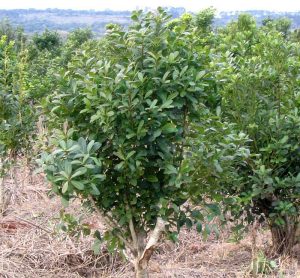 You may know yerba mate as an ingredient in many tea blends and its caffeinated leaves have been used for centuries to make a drink similar to black tea. First consumed by indigenous Guaraní people in Paraguay, it is now a popular drink in many South American countries.
You may know yerba mate as an ingredient in many tea blends and its caffeinated leaves have been used for centuries to make a drink similar to black tea. First consumed by indigenous Guaraní people in Paraguay, it is now a popular drink in many South American countries.
This evergreen tree will not grow well outdoors in Melbourne but it will do well inside in a lit up room with consistent watering and looks quite nice as an indoor plant. We have ours in a hot house, where it has been growing quite happily for a couple years and is now getting big enough to harvest.
They do not mind a good prune and this can be simply done by harvesting leaves for cups of tea. They like fertile soil so, if growing in a potting mix, they will benefit from regular feedings.
In summary, this tree can be an indoor plant which both looks good and is useful, providing a great alternative to normal caffeinated drinks.
Read about more of Jaimie’s unusual edible plants on our website.
Yes, you did know!
What to top dress garlic with
Last week, Jennie Ramage asked what she should top dress her garlic with. We only got one reply but, as it was from Angelo Eliades, that’s actually enough!
Here is Angelo’s response: “With top-dressing, the idea is that, as a top-up feed, you sprinkle a small amount of the same fertiliser that was originally used in the main feed, and then water it in. With garlic, this would mean adding some more of the same fertiliser that you used when you planted the garlic.
“Top-dressing is a traditional practice but, in my opinion, is not a sound practice these days. Fertilisers need to be incorporated (mixed) into the soil so that the soil organisms can break them down and slowly release the nutrients in a form available to the plants. If fertilisers are left on the soil surface then the nitrogen in the fertiliser will volatise into the atmosphere and be lost. Furthermore, only highly soluble, and therefore very fast acting, synthetic chemical fertilisers can be sprinkled and watered in, and organic gardeners don’t use such fertilisers. If they are used, plants are force-fed while taking up water and, if used on garlic at the late stages of development, the high levels of soluble nitrogen will promote (force) green growth at the expense of bulbs, resulting in lots of garlic leaves at the top, and disappointingly small bulbs below the soil.
“Rather, if you want to do something, my suggestion is that you either lightly dig in some organic fertiliser into the soil or place it under the mulch (if such mulch exists).”
How to keep rats out
Last week, Vicki Jordan asked what hole size in a wire fence would allow bees and other pollinators in but keep rats out.
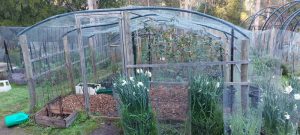 Douglas Bell: “After a lot of trial and error, the only way that I have succeeded in keeping out rats is to have a structure fully enclosed in aviary mesh with an aperture size of 12½ by 12.5½mm (see photo right). The bees pass through it easily. I use mesh where the wires are 0.7mm in diameter because the 1.24 mm thickness mesh is much harder to work with, more expensive and (in my garden) unnecessary. I dig a 10-12 cm trench around the border and set the mesh in the bottom of it, curved outwards to stop rats and rabbits burrowing underneath.”
Douglas Bell: “After a lot of trial and error, the only way that I have succeeded in keeping out rats is to have a structure fully enclosed in aviary mesh with an aperture size of 12½ by 12.5½mm (see photo right). The bees pass through it easily. I use mesh where the wires are 0.7mm in diameter because the 1.24 mm thickness mesh is much harder to work with, more expensive and (in my garden) unnecessary. I dig a 10-12 cm trench around the border and set the mesh in the bottom of it, curved outwards to stop rats and rabbits burrowing underneath.”
Angelo Eliades: “Generally, rats can squeeze through any gap or hole that is larger than their head, and a rat’s skull is around 15-20mm in width, so they can fit through surprisingly small openings around 20-25mm in diameter or wider. The mesh size of any wire has to be smaller than that to keep them out.”
Newsletter reader tip – kiwifruit is in season
Celesta Van der Paal has written in to remind people that kiwifruit are currently in season in Melbourne. There aren’t many local kiwifruit growers but one such is Rayner’s Orchards in Woori Yallock. They are currently selling their kiwifruit for $6/kg in 1kg packs in their shop and the fruit should continue to be available until mid September. Their shop is at 60 Schoolhouse Road, Woori Yallock and is open 7 days a week, 9am-4pm.
Not food-related by interesting
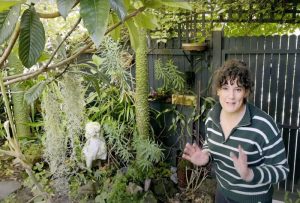 Newsletter reader, Chloe Thomson, has started producing videos about selected Melbourne home gardens. The series is called Behind the garden gate and is being published on YouTube.
Newsletter reader, Chloe Thomson, has started producing videos about selected Melbourne home gardens. The series is called Behind the garden gate and is being published on YouTube.
There are 5 in the series thus far, each featuring a garden in a different suburb of North East Melbourne: Alphington, Park Orchards, Preston, Reservoir and West Brunswick.
The Melbourne ‘Local Food Connections’ community radio show
This upcoming Sunday’s episode will feature Chelsea McNab talking about ECOSS and food security in the Yarra Valley. Listen on 3CR (855 AM) on Sunday morning, 10-10.30am, by tuning into either the station (855 AM) or its livestream. You can also email the host, Ann Stanley, at localfoodconnectionsradio@gmail.com
Mitcham Community Meal
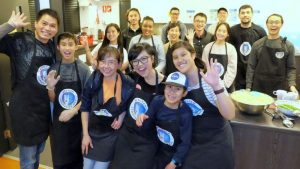 Mitcham Community Meal provides a free community dinner every Sunday evening, where each meal is cooked by a different local community group. During July, the cooking teams were Belmore Road Church of Christ, Freeman & friends, Grace Church, One Community Church and Vermont PS. Look at some photos of these teams, plus those of previous teams.
Mitcham Community Meal provides a free community dinner every Sunday evening, where each meal is cooked by a different local community group. During July, the cooking teams were Belmore Road Church of Christ, Freeman & friends, Grace Church, One Community Church and Vermont PS. Look at some photos of these teams, plus those of previous teams.
Another article from Leaf, Root & Fruit
Duncan Cocking has published the 6th and 7th articles in his 37-part(!) series of articles on establishing a vegetable patch from scratch:
Some free, online magazines
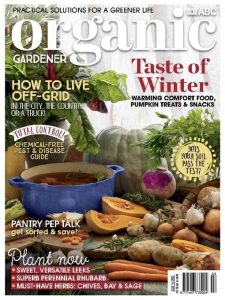 FYI, all editions of ABC Organic Gardener, Better Homes and Gardens Australia and Gardening Australia (and many other magazines) are available for free from many libraries, including Boroondara Library Service, Eastern Regional Libraries, Moreland City Libraries, Whitehorse Manningham Libraries and Yarra Plenty Regional Library. Access is via something called ‘Overdrive’ if using a computer or via an app called ‘Libby’ if using a phone. So, for example, yprl.overdrive.com/library/magazines is the link to Overdrive on the Yarra Plenty Regional Library website.
FYI, all editions of ABC Organic Gardener, Better Homes and Gardens Australia and Gardening Australia (and many other magazines) are available for free from many libraries, including Boroondara Library Service, Eastern Regional Libraries, Moreland City Libraries, Whitehorse Manningham Libraries and Yarra Plenty Regional Library. Access is via something called ‘Overdrive’ if using a computer or via an app called ‘Libby’ if using a phone. So, for example, yprl.overdrive.com/library/magazines is the link to Overdrive on the Yarra Plenty Regional Library website.
Which link was clicked most times in the last newsletter?
The most popular link in the last newsletter was the Sustainable Macleod online shop.
As you will know from last week’s newsletter, the Sustainable Macleod online shop currently offers a range of Queensland Fruit Fly control products (Wild May, lure bottles and netting) at cost price. The online shop is managed by Paul and Robin Gale-Baker and I (Guy) would like to take this opportunity to thank them for this and their other significant contributions to the local food movement. In this particular case, they had to interrupt their holiday in Queensland to add the items to the shop in time for the newsletter being distributed. Thanks Paul and Robin!
 Joke (or pun) of the week
Joke (or pun) of the week
An eight-year old boy had never spoken a word. One afternoon, as he sat eating his lunch, he turned to his mother and said, “The soup is cold.”
His astonished mother exclaimed, “Son, I’ve waited so long to hear you speak. But all these years you never said a thing. Why haven’t you spoken before?”
The boy looked at her and replied, “Up until now, everything has been satisfactory.”
Regular activities over the coming week
Farmers’ and other food markets
As may know from previous newsletters, Farm Raiser, who are an urban farm based in Bellfield, have a farmgate stall on Fridays 10am-2pm and Saturdays 9am-midday, opposite 12 Perkins Avenue, Bellfield. They now sell bread, milk, seasonal fruit and preserves as well as veggies. These farmgate stalls have been added to the website calendar and also to the list below.
- Friday: Community Grocer, Carlton and Farm Raiser farmgate (Bellfield).
- Saturday: Carlton, Coburg and Farm Raiser farmgate (Bellfield).
- Sunday: Alphington Eltham.
- Tuesday: Community Grocer, Fitzroy.
- next Wednesday: Really Really Free Market (Coburg).
Food swaps
- Saturday: Bayswater North, Brunswick East, Collingwood, Fitzroy, Heidelberg West, Mernda, Pascoe Vale and Glenroy, Rosanna and Warrandyte.
- Sunday: Blackburn, Montmorency and Regent (Reservoir).
Community gardens
- Thursday: Diamond Valley Library (Greensborough), Edible Hub (Hurstbridge), SEEDs (Brunswick) and Whittlesea.
- Friday: Reynard Street (Coburg) and West Brunswick.
- Saturday: Links (Lalor), Macleod and Thrive (Diamond Creek).
- Sunday: Bellfield, Fawkner Food Bowls, Northcote Community, Pentridge (Coburg) and Regent (Reservoir).
- Monday: Panton Hill, SEEDs (Brunswick) and Whittlesea.
- Tuesday: Diamond Valley Library (Greensborough), Doncaster Hill and Watsonia Library.
- Next Wednesday: Bellfield, Eltham Neighbourhood House, Macleod, Newton Street (Reservoir), Span (Thornbury) and Sylvester Hive (Preston) .
Not explicitly food-related but interesting
Waste busters; 2nd Thursday of each month, 10.30-11.30am; free; Mount Evelyn
This is a group to inspire, encourage and support you to make changes to reduce your waste. Share ideas, brainstorm solutions and hear from guest speakers. Organised by Mount Evelyn Community House.
What to do about waste?; Thursday, 31st August, 10.30-11.30am; free; Mount Evelyn
Join Yarra Ranges Council’s Waste Education Officer to learn more about the council’s waste and recycling collections. Learn about ways to reduce your waste, ask questions and find out more about changes currently happening to the waste collections. Organised by Mount Evelyn Community House.
Upcoming face-to-face events – not cooking
Rachel’s Farm (film premier); Sunday, 6th August, 2-4.30pm; $25; Hawthorn East.
Film director and actress Rachel Ward is also a farmer. Her film Rachel’s Farm provides insight into her voyage from wilful ignorance about the ecological impacts of conventional agriculture to embracing a movement to restore the health of Australia’s farmland, food and climate. Here’s the trailer. Following the film, there will be a Q&A with Rachel Ward together with Dani Valent, Joost Bakker, Maree Lowes and Monique Ryan.
Rachel’s Farm (film premier); Sunday, 6th August, 4-6.30pm; $24; Carlton.
Film director and actress Rachel Ward is also a farmer. Her film Rachel’s Farm provides insight into her voyage from wilful ignorance about the ecological impacts of conventional agriculture to embracing a movement to restore the health of Australia’s farmland, food and climate. Here’s the trailer. Following the film, there will be a Q&A with Rachel Ward together with Cinnamon Evans, Joanna Lauder, Joost Bakker and Paul Sinclair.
Composting workshop; Saturday, 19th August, 1-2.30pm; free; Forest Hill.
Adam Grubb, from Very Edible Gardens, will discuss which compost system is right for you plus how to problem solve and manage your system.
Cultivating Community workshop; Saturday, 9th September, midday-2pm; free; Carlton.
Learn about all matters related to growing food, food waste, composting and the circular economy.
Introduction to growing microgreens; Sunday, 24th September, 10am-midday; $80 ($40 per hour); Preston.
You will learn: how CERES produces certified organic microgreens for wholesale in Preston; how to grow pea shoots, radish, and sunflower sprouts at home; and how to plan for a continuous supply of these. Presenter: Jess Holland.
Farming for our future (ages 5 to 8); Tuesday, 26th September, 10am-midday; free; CERES.
This workshop for children aged 5-8 years and each child must be accompanied by an adult guardian. Explore Honey Lane Organic Farm and meet some chickens. Make a recycled pot and propagate your own plant to take home.
Farm to fork (ages 3 to 5); Wednesday, 27th September, 1-3pm; free; CERES.
This workshop for children aged 3-5 years and each child must be accompanied by an adult guardian. Explore the CERES market garden and visit the chickens and bees. Learn how to turn food waste into healthy soil for plants with help from worms. Learn how to safely plant seeds into soil and care for them as they grow.
In August
- Community soup night; Wednesday, 2nd August, 4.30-7.30pm; free; Preston.
- Garden design with Kat Lavers; Wednesday, 2nd August, 6.30-8.30pm; free; Doncaster.
- Composting workshop; Friday, 4th August, 10-11am; free; Box Hill South.
- Grafting and tree sales day; Saturday, 5th August, 10am-midday; free; CERES.
- Winter fruit tree pruning with Chris England; Saturday, 5th August, 10am-1pm; $70 ($23 per hour); Richmond.
- Urban wine walk; Saturday, 5th August, midday-4pm; $82; Brunswick.
- Mushroom farm tour; Saturday, 5th August, 2-2.30pm; $27 ($54 per hour); Alphington.
- The how-to of worm farming with Felicity Gordon; Saturday, 5th August, 2-3.30pm; $15; Macleod.
- Permaculture Design Course (100 hours); mostly Wednesday evenings, starting 5th August, 6.30-9.30pm; $2,200 ($22 per hour); CERES.
- Grafting and tree sales day; Sunday, 6th August, 10am-midday; free; Templestowe.
- Rachel’s Farm (film premier); Sunday, 6th August, 2-4.30pm; $25; Hawthorn East.
- Rachel’s Farm (film premier); Sunday, 6th August, 4-6.30pm; $24; Carlton.
- How to drink Australian (book launch); Monday, 7th August, 6-9pm; $30 ($10 per hour); Abbotsford.
- Backyard chickens; Wednesday, 9th August, 11am-midday; free; Croydon.
- Care of backyard chickens; Thursday, 10th August, 11am-midday; free; Greensborough.
- Grafting workshop; Friday, 11th August, 10am-midday; $20; Fairfield.
- Grafting workshop; Friday, 11th August, 1-3pm; $20; Fairfield.
- Grafting workshop; Saturday, 12th August, 10am-midday; $20; Fairfield.
- Winter pruning workshop with Angelo Eliades; Saturday, 12th August, midday-2pm; suggested donation of $5-10; Coburg.
- Urban wine walk; Saturday, 12th August, midday-4pm; $82; Brunswick East.
- Grafting workshop; Saturday, 12th August, 1-3pm; $20; Fairfield.
- Pruning workshop; Saturday, 12th August, 2-4pm; $20 ($10 per hour); Templestowe.
- Intro to composting; Sunday, 13th August, 10.30am-12.30pm; $21 ($10 per hour); Preston.
- SEEDs Soup Festival; Sunday, 13th August, 11am-5pm; free; Brunswick.
- Permaculture Design Course (10 sessions); Tuesdays 9am-3pm, 15th August to 10th October plus some Saturdays; $595 ($9 per hour); Ringwood.
- Grow your own mushrooms; Thursday, 17th August, 6.30-9.30pm; $160 ($53 per hour); Collingwood.
- Collectors whisky tasting with Craig Molyneux; Thursday, 17th August, 7-9pm; $97 ($49 per hour); Abbotsford.
- Composting workshop; Saturday, 19th August, 1-2.30pm; free; Forest Hill.
- DIY mushrooms; Sunday, 20th August, 10am-4pm; $175 ($29 per hour); CERES.
- Gut health; Sunday, 20th August, 12.30-1.30pm; free; Richmond.
- Kat Lavers on permaculture; Wednesday, 23rd August, 8-10pm; free; Preston.
- Introduction to worm farming; Thursday, 24th August, 7-8pm; free; Mill Park.
- Edible weeds walk; Saturday, 26th August, 10.30am-12.30pm; $30 ($15 per hour); Coburg.
- Edible weeds walk; Saturday, 26th August, 1.30-3.30pm; $30 ($15 per hour); Coburg.
In September
- Complete urban farmer (14 sessions); weekly sessions starting Friday, 1st September, 9am-3pm; $895 ($11 per hour); CERES.
- Edible weeds; Saturday, 2nd September, 10am-midday; $60 ($30 per hour); CERES.
- In-depth mushroom cultivation workshop; Saturday, 2nd September, 10am-4pm; $149 ($25 per hour); Alphington.
- Growing mushrooms at home; Saturday, 2nd September, 10.30am-1pm; $135 ($54 per hour); Alphington.
- Home composting for beginners; Saturday, 2nd September, 2-3.30pm; free; Edendale.
- Introduction to beekeeping (2 sessions); Saturday, 2nd September, 9.30am-4.30pm and Saturday, 9th September, 10.30am-12.30pm; $225 ($25 per hour); Blackburn North.
- Weed walks with Miranda; Sunday, 3rd September, 9am-midday; $60 ($20 per hour); Mount Evelyn.
- Basic inoculation workshop; Sunday, 3rd September, 10am-midday; $87 ($44 per hour); Alphington.
- Resin art with ink – cheese platter (2 sessions); Monday, 4th September, 7-9pm and Tuesday, 5th September, 7-8pm; $95 ($32 per hour); Mount Evelyn.
- Tomato master class with Penny Woodward; Wednesday, 6th September, 6.30-8.30pm; free; Doncaster.
- Australian plants expo; Saturday, 9th September, 10am-4pm; $5; Eltham.
- DIY beeswax wrap workshop; Saturday, 9th September, 10.30am-12.30pm; $40 ($20 per hour); Brunswick.
- Getting to know bush tucker; Saturday, 9th September, 11am-12.30pm; $20; Ivanhoe.
- Cultivating Community workshop; Saturday, 9th September, midday-2pm; free; Carlton.
- Australian plants expo; Sunday, 10th September, 10am-4pm; $5; Eltham.
- Wicking bed workshop; Sunday, 10th September, 2-3.30pm; $15; Macleod.
- Julie Kos, from Kossies Free Range Egg Farm, on smoked eggs; Wednesday, 13th September, 8-10pm; free; Doncaster East.
- Complete urban farmer (14 sessions); weekly sessions starting Wednesday, 13th September, 9am-3pm; $895 ($11 per hour); CERES.
- Wine and Vine Festival; Saturday, 16th September, midday-7pm; $58; Abbotsford.
- Spring veggie garden design and planting; Sunday, 17th September, 10am-1pm; $165 ($55 per hour); Mount Evelyn.
- Beeswax wrap workshop; Tuesday, 19th September, 2.30-4.30pm; free; Nunawading.
- Beeswax wrap workshop; Wednesday, 20th September, 2.30-4.30pm; free; Doncaster.
Regular events
- Beekeeping workshop; roughly once a month on Saturdays, 1-3.30pm; $85 ($34 per hour); Brunswick East.
- Carlton aperitvio food tour; every Friday, 5-7pm; $139 ($70 per hour); Carlton.
- Classic cocktails; various Tuesdays, 7-10pm; $70 ($23 per hour); Fitzroy.
- Edible Forest tours; every Friday and Saturday, 11am-1pm and again at 1-3pm; $25 ($13 per hour); Dixons Creek.
- Eltham trails (walking food tour); various Saturday mornings and Thursday evenings; $65 ($22 per hour); Eltham.
- Flavours of Coburg food tour; 3rd Saturday of each month, 10am-1pm; $65 ($22 per hour); Coburg.
- Gin making masterclass; most Saturdays, 10am-1pm; $175 ($58 per hour); Nunawading.
- Gin masterclass; most Saturdays and Sundays, midday-1pm; $80 ($80 per hour); Eltham.
- Ratio Cocoa Roasters behind the scenes chocolate factory tour; various Fridays and Saturdays; $20 ($14 per hour); Brunswick.
- Spoon carving workshop; various Saturdays and Sundays, 10am-1pm; $130 ($43 per hour); Coburg North.
- Truffle workshop at Ratio Cocoa Roasters; 3rd Sunday of each month, 11am-1pm; $75 ($38 per hour); Brunswick.
- Wine tasting masterclass; Saturdays, 3-5pm; various prices; Northcote.
Upcoming face-to-face events – cooking
Sourdough basics; Wednesday, 6th September, 6.30-8.30pm; $120 ($60 per hour); Collingwood.
The Fermented Mumma will discuss ingredient selection, starter care, and the processes of sourdough fermentation and baking. At the end, you will take your fermenting dough home to bake in the morning.
Preserving and drying citrus; Thursday, 21st September, 11am-midday; free; Greensborough.
Learn how to make the most of your excess citrus through preserving or drying.
Family miso soup ball making with Rieko Hayashi; Saturday, 23rd September, 10am-midday; $35 ($18 per hour); Fitzroy North.
Make your own little, ready to eat miso balls and take home a container of 12 of them to pop into your fridge or even freeze. End the session with a warm bowl of miso soup. Presenter: Rieko Hayashi.
Introduction to fermenting at home; Sunday, 24th September, 10am-1pm; $80 ($27 per hour); CERES.
What you will learn: the basics to successfully start fermenting vegetables at home; ideas about creating your own fermented condiments; and how to use fermented products in day to day life. What you will get: vegetables that you will prepare in class and take home to ferment; samples of fermented products to taste in class; and notes and recipes. Presenter: Lauren Mueller.
No waste cooking workshop; Wednesday, 27th September, 10-11.30am; free; Bayswater North.
Join them for an educational cooking experience that focuses on simple ways to reduce household food waste. Be inspired to get creative with vegetable scraps, odds and ends and excess seasonal produce, as well as picking up some money-saving tips and tricks. Presenter: Open Table.
In August
- Milk kefir magic; Tuesday, 1st August, 6.30-8.30pm; $125 ($63 per hour); Fitzroy North.
- Warm up with Italian cooking; Thursday, 3rd August, 7-9pm; free; Watsonia.
- Elderberry syrup and fire cider with Miranda; Saturday, 5th August, 9-11.30am; $125 ($50 per hour); Mount Evelyn.
- Sourdough bread making; Saturday, 5th August, 10am-1pm; $55 ($18 per hour); Panton Hill.
- Croquembouche; Saturday, 5th August, midday-4pm; $134 ($34 per hour); Lower Templestowe.
- Warm up with no waste cooking; Thursday, 10th August, 7-8.30pm; free; Ivanhoe.
- Fermenting workshop; Saturday, 12th August, 10am-1pm; $100 ($33 per hour); Kinglake.
- Croissants; Saturday, 12th August, 1.30-4.30pm; $64 ($21 per hour); Lower Templestowe.
- FFS … ferment four staples; Sunday, 13th August, 11.30am-4.30pm; $425 ($85 per hour); Fitzroy North.
- Warm up with no waste cooking; Tuesday, 15th August, 6.30-8pm; free; Lalor.
- Warm up with winter soups; Tuesday, 15th August, 7-8.30pm; free; Eltham.
- Indian cooking – Punjabi (2 sessions); Wednesdays, 16th and 23rd August, both 6.30-8.30pm; $99 ($25 per hour); Hurstbridge.
- Chickpea miso making M.O.B.; Thursday, 17th August, 6.30-8.30pm; $145 ($73 per hour); Fitzroy North.
- Pizza and calzone cooking demonstration; Thursday, 17th August, 7-8pm; free; Thomastown.
- Warm up with Italian cooking; Thursday, 17th August, 7-9pm; free; Mill Park.
- Dumpling making workshop; Friday, 18th August, 6.30-8.30pm; $75 ($38 per hour); Park Orchards.
- Gnocchi making class; Saturday, 19th August, 10am-1pm; $140 ($47 per hour); Thomastown.
- Preserved lemon workshop; Saturday, 19th August, midday-1pm; free; Macleod.
- French patisserie – advanced; Saturday, 19th August, 1.30-4.30pm; $74 ($25 per hour); Lower Templestowe.
- No waste cooking workshop; Saturday, 19th August, 2-3.30pm; free; Ringwood.
- The food of Southern Thailand; Sunday, 20th August, 10am-2pm; $180 ($45 per hour); Panton Hill.
- Japanese cooking class – pickling; Friday, 25th August, 1-2pm; $15; Greensborough.
- Brioche and puff pastry; Saturday, 26th August, midday-4pm; $85 ($21 per hour); Lower Templestowe.
- Veggies in desserts; Sunday, 27th August, 10am-3pm; $120 ($24 per hour); CERES.
In September
- Chocolate making workshop; Friday, 1st September, 6.30-8.30pm; $80 ($40 per hour); Park Orchards.
- Black forest cake; Saturday, 2nd September, 1.30-4.30pm; $98 ($33 per hour); Lower Templestowe.
- Colombian cooking workshop; Wednesday, 6th September, 10am-1pm; $65 ($22 per hour); Balwyn North.
- Sourdough basics; Wednesday, 6th September, 6.30-8.30pm; $120 ($60 per hour); Collingwood.
- Beginners cheese making class; Saturday, 9th September, 10am-5pm; $250 ($50 per hour); Thomastown.
- Turkish cooking, an introduction; Tuesday, 12th September, 6.30-8.30; $65 ($33 per hour); Balwyn North.
- Halloumi cheese making, traditional ricotta and ricotta salata; Saturday, 16th September, 10am-3pm; $240 ($48 per hour); CERES.
- Mozzarella making class; Saturday, 16th September, 10am-midday; $150 ($75 per hour); Thomastown.
- Cheese making; Saturday, 16th September, midday-4pm; $130 ($33 per hour); Kinglake.
- Sourdough bread baking; Sunday, 17th September, 9am-5pm; $190 ($24 per hour); CERES.
Regular classes
- Al dente cooking (Italian); most Saturdays, 9am-1pm; $155 ($39 per hour); Chirnside Park.
- BBQ classes; various days and times; $135-150 ($45-50 per hour); Brunswick East.
- Bread making; various Sundays, 8am-2pm; $230 ($38 per hour); Abbotsford.
- Brunswick Kitchen (many different classes); various dates, times and prices but mostly 2½ hours long and $120; Brunswick.
- Chocolate making and pastry classes for children; various days and times; various costs; Yarra Glen.
- Chocolate making workshop; various Thursdays, Fridays and Saturdays; $152 ($38 per hour); Blackburn.
- Chocolate making workshop; various Saturdays and Sundays; $125 ($63 per hour); Box Hill North.
- Juanita’s Kitchen (plant-based); various dates, times and prices; Preston.
- Kombucha brewing workshop; last Thursday of each month, 7-11pm; $49 ($12 per hour); Brunswick.
- La Cucina di Sandra (Italian); various evenings, 6.30-10.30pm; $120 ($30 per hour); Richmond.
- Margot & Montanez (alfajores biscuits); monthly on Sundays, 10am-1pm ; $109 ($36 per hour); Camberwell.
- Nonna & Mum’s cooking class; 4th Thursday of each month, 7-10pm; $24 ($8 per hour); Thornbury.
- Otao Kitchen (many different classes); various dates, times and prices but mostly 3 hours long and $197; Abbotsford.
- Rosa’s cooking classes (Italian); various Saturdays and Sundays, 10.15am-3pm; mostly $165 ($35 per hour); Bundoora.
- Sourdough bread workshop; roughly once a month on Saturdays, 9-11.30am; $185 ($74 per hour); Brunswick East.
- Taiwanese cooking; 1st Saturday of each month, midday-2.30pm; $126 ($50 per hour); Brunswick.
- Tea blending; various Sundays; $75 ($60 per hour); Brunswick.
- The ultimate biscuit class; various Tuesdays, 10am-3pm; $162 ($32 per hour); Blackburn.
